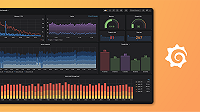Caution
As of 2025-03-11, Grafana OnCall OSS has entered maintenance mode, and will be archived on 2026-03-24. No further feature development will occur; however, we will still provide fixes for critical bugs and for valid CVEs with a CVSS score of 7.0 or higher. For more information, refer to our blog post.
Important: This documentation is about an older version. It's relevant only to the release noted, many of the features and functions have been updated or replaced. Please view the current version.
Advanced template configuration
Grafana OnCall uses the Jinja templating language to format alert groups for various platforms such as the Web, Slack, phone calls, SMS messages, and more. This allows you to customize the presentation and content of alerts when they are triggered.
Jinja2 offers a range of functionalities, including loops, conditions, and functions, which can be used to enhance alert template customization.
Every alert from a monitoring system is received in a key/value format, which Grafana OnCall maps to specific fields, such as:
title, message, image, grouping, and auto-resolve.
To learn more about mapping your alert payload to Grafana OnCall fields, refer to map payloads to OnCall fields.
Loops
Monitoring systems can send an array of values. Use Jinja to iterate and format the alert payloads. For example:
*Values:*
{% for evalMatch in payload.evalMatches -%}
`{{ evalMatch['metric'] }}: '{{ evalMatch['value'] -}}'`{{ " " }}
{%- endfor %}Conditions
Add conditional instructions based on specific alert rules. For instance, to provide instructions when an alert comes from a specific Grafana alert rule:
{% if payload.ruleId == '1' -%}
*Alert TODOs*
1. Get access to the container
```
kubectl port-forward service/example 3000:80
```
2. Check for the exception.
3. Open the container and reload caches.
4. Click Custom Button `Send to Jira`
{%- endif -%}Built-in Jinja functions
Jinja2 includes various built-in functions that can be used in Grafana OnCall. For example, to prettify JSON:
{{ payload | tojson_pretty }}Some commonly used built-in functions include:
abscapitalizetrim
For a full list of Jinja built-in functions, see the Jinja documentation on GitHub
Functions added by Grafana OnCall
Grafana OnCall enhances Jinja with additional functions:
time: Current timetojson: Dumps a structure to JSONtojson_pretty: Same astojson, but prettifiediso8601_to_time: Converts ISO8601 time (2015-02-17T18:30:20.000Z) to datetimedatetimeformat: Converts datetime to string according to strftime format codes (%H:%M / %d-%m-%Yby default)datetimeformat_as_timezone: Converts datetime to string with timezone conversion (UTCby default)- Usage example:
{{ payload.alerts.startsAt | iso8601_to_time | datetimeformat_as_timezone('%Y-%m-%dT%H:%M:%S%z', 'America/Chicago') }}
- Usage example:
datetimeparse: Converts string to datetime according to strftime format codes (%H:%M / %d-%m-%Yby default)regex_replace: Performs a regex find and replaceregex_match: Performs a regex match, returnsTrueorFalse- Usage example:
{{ payload.ruleName | regex_match(".*") }}
- Usage example:
b64decode: Performs a base64 string decode- Usage example:
{{ payload.data | b64decode }}
- Usage example:
parse_json:Parses a JSON string to an object- Usage example:
{{ (payload.data | b64decode | parse_json).name }}
- Usage example:



